
Members of Flint’s Democracy Defense League listened soberly and directed many comments and questions at the state’s new water crisis prosecution team Friday night at UAW Local 659 (Photo by Tom Travis)
By Jan Worth-Nelson
Things started out reasonably well Friday night as the state’s new water crisis prosecution team, led by Wayne County Prosecutor Kym Worthy and Solicitor General Fadwa Hammoud faced down 200 Flint residents at the UAW Local 659 Hall.
The prosecutors were there to explain why 15 days ago the state dropped all criminal charges against eight central figures in the Flint Water Crisis, now in its fifth year. That incendiary move, which came without warning to the residents of a city beleaguered and by what many call “poisoning by policy,” has prompted fiery responses from local politicians and a host of weary “water warriors,” as they have come to be called.
But even for average Flint citizens, hundreds still waiting for pipe replacements and many still using bottled water and not sure if they can trust any government officials or scientists, the action by the state’s new attorney general, Dana Nessel, has been exasperating and confusing at best. Some of that suspicion and fierce calls for accountability spilled out Friday night.
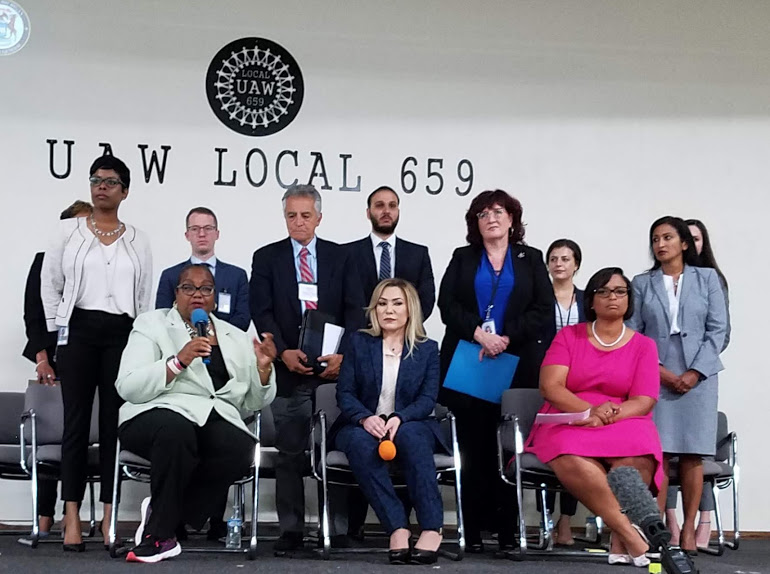
Prosecutor Kym Worthy (seated with mic), Solicitor General Fadwa Hammoud, and moderator Marseille Allen of Flint introduce the eight-member investigation team behind them. (Photo by Tom Travis)
The eight against whom charges were dropped represented some of the most significant indictments from the debacle, which is said to have exposed thousands of children, elderly and those with compromised immune systems to lead toxicity. The crisis also has been implicated in 12 deaths attributed to Legionnaire’s Disease.
Those eight are former emergency managers Darnell Earley and Gerald Ambrose, Department of Environmental Quality official Patrick Cook, Former Flint Department of Public Works director Howard Croft, former Department of Health and Human Services Director Nick Lyon, DHHS officials Nancy Peeler and Robert Scott, and former Chief Medical Officer for the state Eden Wells.
They were indicted by former Attorney General Bill Schuette in a series of sensational announcements over the past three years–often drawing national attention. Schuette lost to Whitmer in the governor’s race last year. His chief Flint investigator, Todd Flood, was fired by Nessel in April.
Darnell Earley was the state-appointed emergency manager in Flint when the city made the ultimately disastrous choice to change its water source to the Flint River in April 2014.
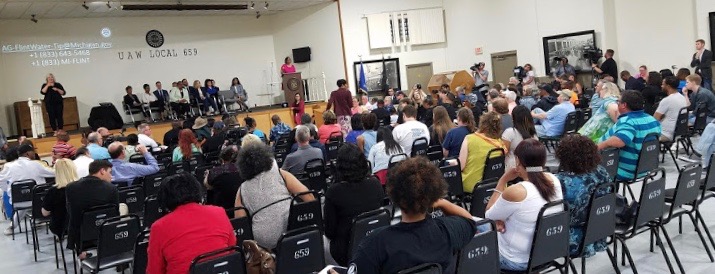
Part of the crowd at UAW Local 659 Hall (Photo by Tom Travis)
In all, over three years Schuette indicted 15. Seven of those pleaded “no contest” in plea deals that will leave them with no criminal record– and they cannot be subject to the same charges again because of double jeopardy. On that group, an original collective total of 16 felony charges and 8 misdemeanor charges were reduced to 7 misdemeanors, Worthy said.
The seven who fall in that group are Michael Prysby, Stephen Busch, Liane Shekter Smith, Adam Rosenthal–from the Michigan Department of Environmental Quality; Mike Glasgow and Daughterty Johnson, who both worked for the City of Flint; and Corinne Miller of the Michigan Department of Health and Human Services.
Hammoud and Worthy explained the charges on the group of eight were dropped “without prejudice,” meaning charges could be reinstated, starting from scratch, if new evidence emerges. And in fact, the claimed unearthing of millions of pages of unshared evidence was the key to their decision.
Hammoud said, “It’s no secret that we had some very real concerns,” about the investigation, which over three years has cost Michigan taxpayers about $30 million.
Those concerns turned to action when, as Worthy described, 20 boxes of documents marked “Flint” were found in the basement of the State Building after Gretchen Whitmer’s administration took over from former Gov. Snyder.
That discovery was one of several; others yielded hard drives containing phone dumps. Eventually, search warrants were issued, resulting in the collection of 600 devices from about 65 state employeess–cell phones, iPads, laptops–including the cell phone of Snyder himself as well as devices of Rich Baird, Snyder’s lead water crisis liaison with Flint.
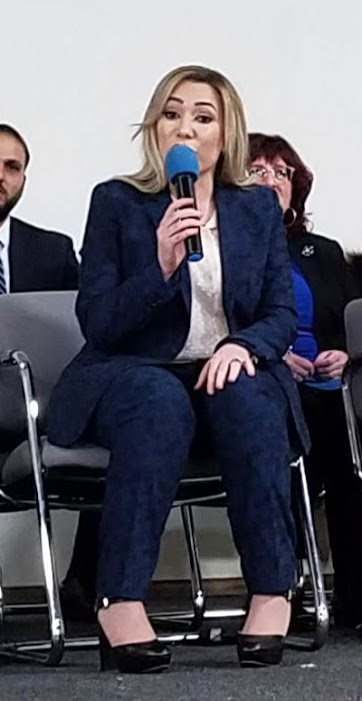
Fadwa Hammoud, Hammoud is the first Arab American and first Muslim Solicitor General in U.S. History (Photo by Tom Travis)
Concern spiraled into outrage, she said, as the prosecutors realized what they found was not part of what had been forwarded in “discovery,” the required process of sharing evidence between the prosecution and defense sides of a case.
“We had been told that we already had all the evidence,” Worthy said.
Further, much of the information forwarded to prosecutors was redacted, a practice she said she had never seen before in such cases.
With much potential evidence having not been shared, “I told Fadwa, we’re going to have to start from scratch.”
“We thought to ourselves, what else did they keep? Have the right people been charged? Who else is out there who hasn’t been charged? It’s appalling,” she said.
“So was this a real investigation?” Worthy shouted to the crowd.
“NO!” many of them answered.
So, Hammoud and Worthy related, the new prosecution team assembled and started over.
“You have a team working day in and day out to assure that anyone criminally responsible that could be proven in court, no matter where they are on this earth, we will charge them,” Hammoud said. “This team is fearless, they are dedicated, and they are very committed. We will get it done and make the right and just decision.”
And they probably have only nine months to do it — because the statute of limitations, if evidence of a crime is uncovered, is six years for misdemeanors and six to ten years for most felonies from the date of the crime — going back to 2014.
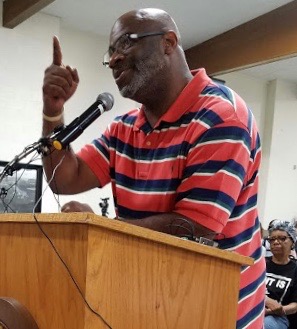
Flint activist Art Woodson (Photo by Tom Travis)
As Hammoud and Worthy laid out their narrative with a series of slides on the wall behind them, the audience erupted from time to time with “IT’S A SHAME” and “THAT’S TERRIBLE.”
“What I saw here today pisses me off,” activist Art Woodson said. “I really trusted Todd Flood. I advocated for Todd Flood. I have PTSD, and it’s hard to trust. This has me feeling that you all are working for the people, and I feel like I’m part of the recovery.”
“I have a heavy heart right now,” Flint resident Marijoyce Campbell cried into the mic, almost keening. “I cannot believe this happened. Please tell me some heads are going to roll–please tell me that somebody is going to pay for all this murder and all this criminal activity. Please tell me how can this happen in 2019.”
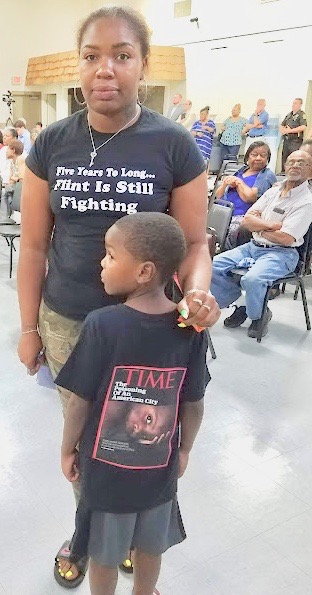
Ariana Hawk, whose son was pictured on the cover of Time Magazine at the height of the crisis (Photo by Tom Travis)
Matters got more tense as the members of the Democracy Defense League, a group of activists formed even before the water crisis to stand against the states’ emergency manager law, warned Hammoud and Worthy that if they were not accountable in the new investigation, they would not be let off the hook.
DDL members criticized the prosecution team for waiting 15 days before meeting with Flint residents. They urged the team to go after Rick Snyder himself–and others connected with the water fiasco (“Gov. Snyder didn’t pull this off by himself,” one resident said. “It was a three-way heist, the state, the EPA and the county.”
“This news today is like being hit in the back of the head with a two-by-four,” activist Claire McClinton said. “We promise you this. You are sitting in a hall of the founding union of the great Sit-Down Strike…we will take our own actions. We are going to throw out all the nets to bring justice home.
“We appreciate you, we take you at your word, but we are going to be holding you accountable, and you’re gonna get the wrath of this city that we probably should have given to Todd Flood. You gonna pay the price. We will not back down,” she said to cheers and applause.
Attorney General Nessel was not present for the presentation. A ripple of boos erupted when moderator Marseille Allen, a community advocate and Flint resident, announced Nessel would not be there. Instead, she read a prepared statement from the AG.
“As essential as it is for the people of Flint to have their questions answered, it is equally important that they are assured they will receive justice,” Nessel wrote.
She explained that as attorney general she could not represent both the civil and criminal sides of the water crisis cases. She said she chose the civil side because those cases — described to Flint residents in a separate town hall Thursday night — were “of paramount importance to me.”
So she appointed Worthy and Hammoud, who will not report to her and cannot be overseen by the AG’s office. She said she gave them two goals: ” to hold any wrongdoers accountable for their actions; and to ensure the integrity of their work so that the residents of Flint could trust the process.”
Hammoud and Worthy emphasized Flint residents could help by forwarding information that might be helpful to the investigation to 833-643-5468, 833-MI-FLINT, or using AG-FlintWater-Tip@michigan.gov.
This story has been updated to add details on the group of seven who had been indicted by former Attorney General Schuette but who pleaded “no contest” in plea deals that will leave them with no criminal record.
EVM Editor Jan Worth-Nelson can be reached at janworth1118@gmail.com. EVM Staff Writer Tom Travis contributed to this report. He can be reached at tomntravis@gmail.com.


You must be logged in to post a comment.